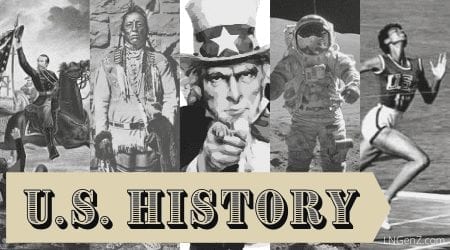-
American Pre-History
-
US History
- Why History Matters – Lesson – VIDEO
- The Importance of History: The Past Is the Key to the Future – Lesson
- Presentism and Its Evil – Lesson
- Historical Statues: Should they Stay or Go – Lesson
- Civil Unrest in the United States: A History – Lesson
- Presidents and the Cost of War – Lesson
- Presidents and the Cost of War – Quiz
-
Arrival of Europeans
-
Westward Expansion
-
Civil War and Reconstruction
- The Roots and the Rise of the Civil War – Lesson
- The Roots and the Rise of the Civil War – Quiz
- Civil War: The War Between the States – Lesson
- Civil War: The War Between the States – Quiz
- Reconstruction: Trying to Rebuild a Broken Nation – Lesson
- Reconstruction: Trying to Rebuild a Broken Nation – Quiz
-
Immigration and America
-
20th Century and Modern America
- Black Lives Matter and the Anarchists of 1919 – Lesson
- Prohibition: The Failed Attempt to Outlaw Drunkenness – Lesson
- Attack on Pearl Harbor: Bringing America into World War II – Lesson
- Survivors Tell Their Stories on 80th Anniversary of Pearl Harbor Attack – Lesson
- Survivors Tell Their Stories on 80th Anniversary of Pearl Harbor Attack – Quiz
- Marion Robert Goff: A Soldier’s Tale on D-Day – Lesson
- Marion Robert Goff: A Soldier’s Tale on D-Day – Quiz
- France Says ‘Merci Les Américains’ on Bastille Day – Lesson
- France Says ‘Merci Les Américains’ on Bastille Day – Quiz
- A Closer Look at Martin Luther King’s ‘I Have a Dream’ Speech – Lesson
- A Closer Look at Martin Luther King’s ‘I Have a Dream’ Speech – Quiz
- 50 Years Since Nixon Went to China: Ping-Pong Diplomacy – Lesson (Part 1)
- 50 Years Since Nixon Went to China: Ping-Pong Diplomacy – Quiz
- 50 Years Since Nixon Went to China: ‘The Week That Changed the World’ – Lesson (Part 2)
- 50 Years Since Nixon Went to China: ‘The Week That Changed the World’ – Quiz
-
The 21st Century: A New Millennium
Civil Unrest in the United States: A History – Lesson
Protests and riots – and even rebellions – are all a part of American history.
Frederick Douglass was an escaped slave who became an antislavery activist. In 1866, he wrote an essay for The Atlantic on the benefits of rebellion: “There is cause to be thankful even for rebellion. It is an impressive teacher, though a stern and terrible one.” Protests and violent civil unrest are not a new thing in America. Today, most American’s don’t view violence as a way to create positive change. Most importantly, peaceful protest and the right to petition the government for change are protected by the United States Constitution.
Colonial America
 In the early colonial days, settlers committed many rebellious acts against the rule of England. The most famous account of civil unrest was the Boston Tea Party. The protesters were tired of English Parliament increasing taxes without allowing the American colonists any representation. On December 16, 1773, at Griffin’s Wharf in Boston, Massachusetts, colonists dressed as Native Americans boarded ships and dumped 342 chests of tea, imported by the British East India Company, into the harbor. The event was a forewarning to King George III that the colonists wouldn’t allow for oppression in the new world. It was one of the most significant events in rallying patriots to fight for independence.
In the early colonial days, settlers committed many rebellious acts against the rule of England. The most famous account of civil unrest was the Boston Tea Party. The protesters were tired of English Parliament increasing taxes without allowing the American colonists any representation. On December 16, 1773, at Griffin’s Wharf in Boston, Massachusetts, colonists dressed as Native Americans boarded ships and dumped 342 chests of tea, imported by the British East India Company, into the harbor. The event was a forewarning to King George III that the colonists wouldn’t allow for oppression in the new world. It was one of the most significant events in rallying patriots to fight for independence.
The United States of America
The rebellious activities of American settlers brought forth the ultimate protest: In April 1775 shots were exchanged between the red-coated British army and the colonists’ homegrown militia. That first shot is described still in present day as “the shot heard round the world.” The event was the catalyst of the American Revolutionary War and the beginning of a new nation based on freedom from tyranny.
As the United States of America fought and won their freedom from England, riots and protests were commonplace. Issues at stake were labor, governing, rent control in larger cities, hunger, and, of course, race. Around the time of the American Civil War, military draft protests and riots popped up across the nation.
The 1960s
The 1960s was a decade for protests from the Civil Rights movement, outrage against the draft for the Vietnam War, and anger toward one political party that had gone against the wishes of its members. It all came together in 1968 – a year of over 100 riots following the death of Civil Rights activist Reverend Martin Luther King, Jr.
Americans are rebellious against oppression and tyranny as a rule. Even as bad as things got right after the death of George Floyd, it still hasn’t been nearly as bad as some of the riots and rebellions from the past.
Are the events of today similar to those of history, or would change be better achieved by peaceful protest of the kind promoted by Martin Luther King, Jr.?
Whatever the best way of bringing change, civil unrest and protest don’t come from nowhere. As Frederick Douglass concluded in The Atlantic essay a century and a half past, “The thing worse than rebellion is the thing that causes rebellion.”